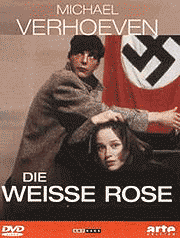Revolution #81, March 11, 2007
Check It Out: Swing Kids, The White Rose and Sophie Scholl
 |
 |
 |
The 1993 movie Swing Kids takes place in 1930s Germany when Nazi marches, polkas, and German folk songs were the enforced culture of the Third Reich and membership in the Hitler Youth was near mandatory. Robert Sean Leonard and Christian Bale play members of the "Swing Kids"--an underground movement of youth who listen to banned jazz. They wear pork pie hats and baggy cool clothes, dance some ferocious jitter-bugging in underground clubs, and sing the lyrics of Harlem hits while spinning vinyl recorded by Black and Jewish musicians, like Count Basie, Artie Shaw, or Bennie Goodman. They frequently get into street fights with Nazi youth and after one of them, a guitarist, gets his hand smashed by a Hitler Youth, he declares he will now play like Django Reinhardt, the extraordinary Roma jazz musician who played with two fingers of his left hand. This was at a time when Roma people (derogatorily referred to as gypsies) were being targeted for persecution by the Nazis. Later, when asked by a Nazi to play a German song, the youth refuses as a matter of principle, saying "there are no more German songs, only Nazi songs."
The Swing Kids face an extremely hostile and repressive environment where the stakes are huge and the pressure to conform is intense and deadly. Forced to join the Hitler Youth, they decide to try and compromise--to be "Swing Kids by night and Hitler Youth by day." But this compromise proves impossible. Around them, there are signs of scattered resistance, like a bookshop where fake passports to help Jews escape are hidden in a rare volume of Faust. But the main atmosphere is one of complicity, as even their parents try to preserve their own well-being and safety and stay silent in the face of increasingly fascist repression. The Swing Kids find that you can try to preserve some privilege and comforts by selling your soul to the devil, or you can stand for your convictions and do the right thing and that what you do does matter--it don’t mean a thing if it ain’t got that swing do wa do wa do wa do wa do wa do wahhhh.
The story of another group of courageous youth in Nazi Germany is told in the movies The White Rose (1982) and Sophie Scholl: The Final Days (2005). The White Rose captures the excitement and camaraderie of youth at Munich University, boisterous and questioning up in the face of increasing Nazi repression on the campus. A professor defiantly lectures students on Spinoza (a Jewish philosopher) even as the Hitler Youth barge their way into the class to spy on and intimidate the professor and his students.
It is 1942-1943, and every citizen in Germany is expected to support the German troops in World War 2. But the White Rose youth agitate for the defeat of Germany, finding covert ways to distribute fliers all over Munich--right under the very noses of Nazi officials who are desperate to discover their source. A small group of Catholic students form a clandestine anti-Nazi group, determined to expose the real agenda and activity of the government. Leaflets appear in desks and books at the university and travel throughout Germany through the mail, exposing the truth about the death camps and Nazi agenda and challenging students and others to act. When freshman Sophie Scholl learns about the White Rose, she becomes its first female member and one of the most creative and daring people involved.
The White Rose youth and the Swing Kids suffered sharp repression. Hundreds of Swing Kids were arrested and some were sent to concentration camps. Sophie Scholl and other members of the White Rose were executed in 1943. These movies show us the courage and conviction of these rebellious youth. But there is also a cautionary tale here about the danger of complicity and silence and the tremendous price paid for resistance that is too little and too late.
If you like this article, subscribe, donate to and sustain Revolution newspaper.



